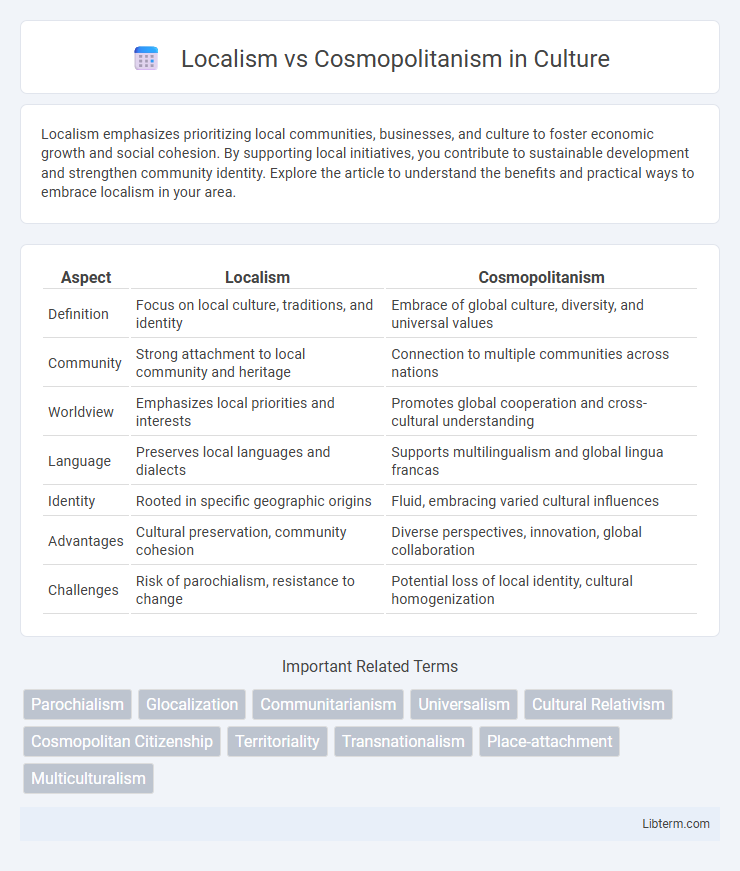Localism emphasizes prioritizing local communities, businesses, and culture to foster economic growth and social cohesion. By supporting local initiatives, you contribute to sustainable development and strengthen community identity. Explore the article to understand the benefits and practical ways to embrace localism in your area.
Table of Comparison
| Aspect | Localism | Cosmopolitanism |
|---|---|---|
| Definition | Focus on local culture, traditions, and identity | Embrace of global culture, diversity, and universal values |
| Community | Strong attachment to local community and heritage | Connection to multiple communities across nations |
| Worldview | Emphasizes local priorities and interests | Promotes global cooperation and cross-cultural understanding |
| Language | Preserves local languages and dialects | Supports multilingualism and global lingua francas |
| Identity | Rooted in specific geographic origins | Fluid, embracing varied cultural influences |
| Advantages | Cultural preservation, community cohesion | Diverse perspectives, innovation, global collaboration |
| Challenges | Risk of parochialism, resistance to change | Potential loss of local identity, cultural homogenization |
Defining Localism and Cosmopolitanism
Localism emphasizes strong attachment to one's local community, prioritizing local culture, traditions, and governance, fostering a sense of belonging and identity rooted in specific geographic areas. Cosmopolitanism advocates for global citizenship, embracing cultural diversity, interconnectedness, and universal values that transcend national or local boundaries. These contrasting philosophies shape perspectives on social integration, political policies, and cultural exchange in an increasingly globalized world.
Historical Roots of Localism
Localism traces its historical roots to pre-industrial societies where communities relied heavily on localized economies, governance, and cultural practices to maintain social cohesion and sustainable resource management. This emphasis on local autonomy emerged prominently during the reaction against centralized states in the 19th century, reflecting a desire to preserve unique regional identities and traditions. Historical movements like agrarianism and municipalism further reinforced localism by advocating for self-sufficient communities and decentralized political authority.
The Evolution of Cosmopolitan Thought
The evolution of cosmopolitan thought traces back to ancient Stoicism, emphasizing universal citizenship and moral duty beyond local affiliations. Enlightenment philosophers expanded this idea, advocating global justice and human rights as foundational principles transcending national borders. In the modern era, globalization and digital communication have further advanced cosmopolitanism by fostering cross-cultural understanding and interconnectedness.
Cultural Identity and Community Belonging
Localism emphasizes the preservation of cultural identity through deep-rooted traditions and shared history, fostering a strong sense of community belonging within specific geographic areas. Cosmopolitanism promotes a global cultural exchange that broadens identity beyond local boundaries, encouraging inclusivity and diversity while potentially diluting traditional local customs. Balancing localism and cosmopolitanism is essential for maintaining cultural heritage while embracing the benefits of global interconnectedness.
Economic Implications: Local vs Global Markets
Localism emphasizes supporting small businesses and local supply chains, resulting in economic resilience and reduced carbon footprints by limiting transportation costs. Cosmopolitanism promotes integration with global markets, driving economies of scale, access to diverse resources, and increased innovation through international trade and investment. Balancing local economic stability with global market opportunities is crucial for sustainable economic growth and community well-being.
Political Perspectives on Localism and Cosmopolitanism
Political perspectives on localism emphasize the importance of local governance, community engagement, and preserving cultural identities to enhance democratic participation and self-determination. Cosmopolitanism advocates for global cooperation, universal rights, and transnational institutions to address global challenges and promote inclusivity beyond national borders. The debate juxtaposes local autonomy against global interconnectedness, shaping policies on immigration, environmental regulation, and economic globalization.
Environmental Sustainability in Local and Global Contexts
Localism emphasizes environmental sustainability by promoting resource conservation, biodiversity protection, and reduced carbon footprints through community-based initiatives and localized economies. Cosmopolitanism supports global environmental cooperation, advocating for multinational agreements and shared technological innovations to address climate change and ecological degradation worldwide. Both approaches highlight the necessity of integrating local practices and global policies to achieve sustainable development and mitigate environmental risks effectively.
Social Cohesion and Diversity in Practice
Localism fosters social cohesion by strengthening community bonds through shared traditions and localized governance, enhancing trust and collective identity. Cosmopolitanism promotes diversity by embracing cultural plurality and encouraging cross-cultural interactions, which can challenge homogeneous social norms. Balancing localism and cosmopolitanism in practice requires integrating inclusive policies that uphold community solidarity while accommodating diverse populations.
Challenges and Criticisms of Both Approaches
Localism faces challenges such as economic isolation, limited cultural exchange, and resistance to globalization, which can hinder innovation and diversity. Cosmopolitanism is criticized for potentially eroding local identities, promoting elitism, and overlooking the unique needs of communities. Both approaches struggle to balance global interconnectedness with preserving local traditions and social cohesion.
Future Prospects: Striking a Balance
The future prospect of localism versus cosmopolitanism hinges on integrating community-rooted values with global interconnectedness to foster sustainable development and cultural diversity. Emphasizing smart urban planning and digital innovation can enhance localized economies while maintaining access to global markets and ideas. Policymakers must prioritize adaptive governance models that respect local identities and support cross-border collaboration to achieve resilient and inclusive societies.
Localism Infographic

 libterm.com
libterm.com